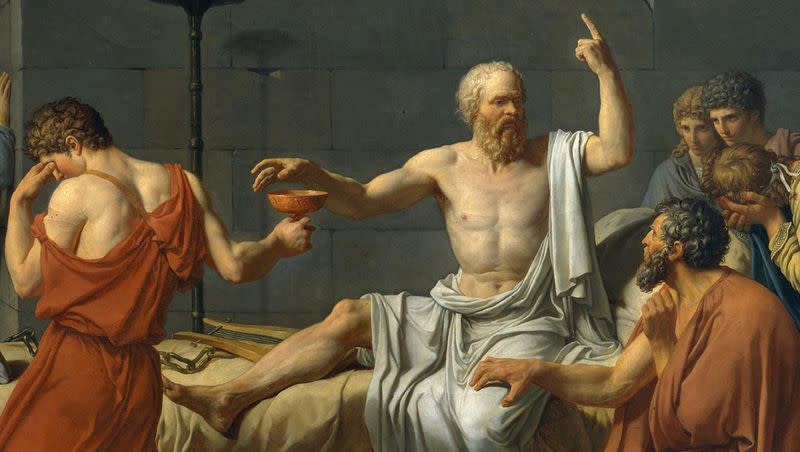Perspective: A defense of the defenders

- Oops!Something went wrong.Please try again later.
The life story of Socrates does not have a happy ending — and yet, it does.
In 399 B.C., Socrates was tried for impiety, sentenced to death and executed by poisoning. That’s terribly sad, of course, but if that’s all there was to the story, humanity would have forgotten about it long ago.
None of us would know the story today but for the record left behind by Plato, a student who was so inspired by Socrates’ eloquent defense that he immortalized it in his “Apologia.”
In modern English, an “apology” or “defense” tends to imply weakness and wrongdoing. But Socrates’ famous “Apologia,” as told by Plato, is monumental for its strength and conviction. It’s known for incisive rhetoric, thought-provoking logic and a heroic stance against injustice. Socrates’ life ended tragically, but the power of “Apologia” to expand minds lives on. Socrates’ courage and devotion to truth have inspired generation after generation, earning him a form of immortality.
The vocabulary confusion over “Apologia,” however, carries over into modern religious apologetics. You can’t blame anyone for wondering: What are you apologizing for?
Even after spending 12 years volunteering for the apologetics organization FAIR, I would never introduce myself as an “apologist” because it’s just confusing. Plato and I need a better term.
How about “defender”?
C. S. Lewis has been called “the Mount Everest of Christian apologists” for his fearless and lively defense of Christian doctrine and history. From G.K. Chesterton and George MacDonald to the great theologians Augustine and Aquinas, Christianity has a noble tradition of great thinkers who follow in Socrates’ footsteps as “apologists.” The philosopher Averroës defended Islam articulately, and Maimonides and Baruch Spinoza did the same within Judaism.
FAIR is known for its “apologetics” work regarding The Church of Jesus Christ of Latter-day Saints. When I stumbled into debates regarding my Latter-day Saint faith during college, I was fortunate Google directed me to thorough answers by the apologist Jeff Lindsay. I hadn’t known I was vulnerable, but Lindsay knew someone like me would need help defending my faith in line with the biblical admonition to be “ready always to give an answer to every man that asketh you a reason of the hope that is in you.”
As author Ally Matsoso puts it, “What we love and believe in we naturally defend.” This is true for many different beliefs, not just religion.
Related
Understandably, some wonder if it’s better to stay out of the fray. Can it really be good to engage with all the attacks when it risks contention and consumes time? Shouldn’t we only focus on inviting the Holy Spirit to convert hearts?
English theologian Austin Farrer responds, “Though argument does not create conviction, lack of it destroys belief. What seems to be proved may not be embraced; but what no one shows the ability to defend is quickly abandoned. Rational argument does not create belief, but it maintains a climate in which belief may flourish.”
Defense doesn’t preclude offense. We can debunk critical attacks and provide affirmative reasons to believe. (In fact, researching the answers to critical attacks often leads to discoveries of new and better reasons to believe.) Like it or not, naive college students (and many others) are going to stumble into unfamiliar arguments and discover hitherto unknown gaps in their knowledge. When they look for answers, uninformed responses may not be enough and may, as Farrer realized, imply there’s no answer to a question because it’s unanswerable.
Which would be a shame because questions and answers are exciting. It is no less than the pursuit of truth. That aspiration is increasingly complicated in a public discourse saturated with cynicism and suspicion, especially about things that matter most.
And in fact, my favorite thing about researching and responding to challenging questions through my volunteer work with FAIR is how it provides a spirit of fearlessness in the quest for knowledge.
As we gather for our annual conference this week, the speakers and attendees will share a spirit of joy and fellowship, a natural extension of our common discipleship and commitment to the gospel’s good news.
Some detractors insist there’s something untoward about defending one’s beliefs. Some have sought to make “apologist” into an insult. That’s to be expected when society is increasingly hostile to faith and exerts expanding pressure on believers to stay quiet. Defending one’s faith can be challenging at times, but the spiritual and intellectual rewards are great.
Truth, philosopher Søren Kierkegaard argued, is often found with the minority position precisely because that less dominant view is necessarily forced to defend itself and discover the truth, whereas the majority too often lived in a place of intellectual safety.
As believers of all kind occupy that minority position more and more, let’s not make the mistake of adopting a cynically secular view of those defending faith.
In the end, I think the best term of all for this work — even better than “apologist” or “defender” — is “builder.” Build a magnificent stronghold of well-educated faith.
Then your “Apologia,” like Socrates’, will transcend any circumstances, nurturing yourself and your family’s faith for generations.
Cassandra Hedelius has a law degree from the University of Colorado-Boulder. She is board chairman of FAIR (Faithful Answers, Informed Response), home-schools her four children and writes at cassandrahedelius.substack.com.

